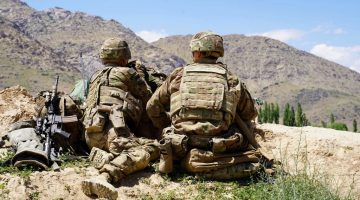Overcoming the First Deployment Jitters

No officer worth their weight wants to admit it. Being anxious or afraid prior to your first deployment is something you aren’t dealing with – it is something someone else is; your subordinates, your parents, or your spouse. But face it – you have a bit of anxiety about your first overseas deployment. Deploying to a contingency zone or facing battle just adds to that anxiety. You may be worried about your relationship at home, your dog if something happens to you, or your subordinates during the worst day you can imagine of the upcoming deployment.
And that’s okay. In fact, it’s normal and healthy.
That doesn’t mean you have to let it stew inside you. There are things you can do and most of them revolve around two words: effective communication. Whether it be with yourself, your family, or your Soldiers, here are some things to communicate about.
Discussions with yourself
Fear. Fear is normal, but letting it stop you is not. If you are in a leadership position, do let fear cause you to shelter or shrink from your duties, miss new experiences or experience a different culture. If you are not in a leadership position, do not let that minor convenience excuse cowardice and a desire to remain inside your comfort zone. The only way to overcome fear is facing it, in whatever form it confronts you. Do not be ashamed of the fear, but do not allow it to win.
The first step in overcoming this fear is identifying it. So take a few hours without any electronic distractions, without any social interactions, completely alone with nothing but a notebook and a pen. Devote the time to think and invest in yourself to identify what fears come to mind. From there, you can develop a plan for each fear on how you will prepare for it, mitigate it, and overcome it.
Fear of discomfort is always high on the list for any deployment. After all, you’re already living in spartan living conditions, away from your loved ones, in an unfamiliar environment, and possibly wearing body armor all the time. For those leading Soldiers in combat, one way this fear manifests itself is the “Breakfast and Dinner” method of patrolling. In this method, units begin their patrols around 0730 or 0800 hours. After all of their personnel had the opportunity to enjoy a hot take out plate from the cooks. They patrol until mid-afternoon, returning in time to ensure their post-mission after action reviews and maintenance are done in time for a hot dinner and an evening of relaxation. This predictable schedule creates many disadvantages, not the least of which are predictability and huge blocks of time where enemy activity is left unchecked.
For those whose daily duties do not involve leading Soldiers on missions, you owe it to yourself and your organization to “get outside” by going on patrol (in a combat zone) or seeing the surrounding countryside and citizens if you are deployed for operations other than war. You gain perspective and first-hand experience that can only serve to build your understanding of the Operational Environment. Additionally, you will make connections and observations about the local culture in conversations with your coalition partners building stronger relationships with our allies. Relationships between two militaries are strengthened by the actions of individual soldiers. The failure to make a decision is a decision.
Regardless where you are deployed, you must confront the fact that you could potentially make a decision that results in the serious injury or death of another person, whether they be American or foreign, civilian or military. Depending on the circumstances of your deployment, you may not even be sober when this situation arises. It is critical that you have this conversation with yourself prior to deploying.
Statistically, a poor decision on your part concerning an automobile is the most likely way you will cause the death of a service member or civilian during your deployment. Even if the local culture makes the Indianapolis 500 appear to be slow moving, it is important to remember the rules of the road and defensive driving skills that you learned in the United States. Perhaps even more so, as your responsibility in the death of a local citizen could have profound strategic effects, as evidenced more than once in South Korea and Okinawa.
Self-Improvement (and making realistic goals). The mistake I make before every deployment is setting unrealistic goals. I always accomplish some of my goals, but not all of them. Granted, I always wait until the flight to my deployment location as the time to make my plan – I know I am not going to be disturbed, I have minimal distractions, and frankly – I have nothing better to do than sit and think.
Self-improvement is more than just physical fitness and health. It is hobbies and interests that make you smarter or happier. It is accomplishing small tasks that lead to feelings of accomplishment and better self-esteem. It is self-care, but also retaining a work-life balance in an environment where you are probably working at least 14 hours a day, seven days a week.
Discussions with your Family
Expectations. The discussions with your family are all about managing expectations – and not just those of your family. You also have expectations that you may not even realize yet, but will come to the surface as your deployment progresses. For example, prior to my first deployment, I had no idea that my sense of time would be severely warped by the isolation of a deployment: What I assumed was a week since the last email from a loved one was really only 2-3 days.
Some expectation-management discussion topics:
- Spending (on both sides of the deployment)
- Frequency and time length of Communications
- Times that are “no call” in order to minimize interruptions during sleeping or work hours
For Combat Deployments: What your family does/doesn’t want to hear about (yes, we all say that OPSEC is paramount, but try to practice good OPSEC about an event that has already happened an hour after you are almost killed and it is the first opportunity to speak with loved ones)
Finances. Money is always a contentious topic, but especially so when the situation changes outside of our own making. Depending on where you are deployed and under what circumstances, you may find your “take home pay” becoming more or LESS than what you currently take home in garrison, and significant changes in your opportunities to spend money. First time deployers may even face the frustration of wondering why their family is “spending so much money” in comparison to the service member, when in reality, the family is spending money on the same necessities it always requires, like groceries, but the service member no longer “sees” or enjoys because they are deployed.
It is important to establish a monthly budget for yourself to buy souvenirs, snacks, try exotic foods, etc so that you don’t overspend but still can have a decent quality of life while “saving through deprivation” (being deployed). Most importantly, establish a monthly limit for how much you spend online and at the PX – overspending at both are incredibly easy to do when there is no other form of recreation.
Are you enrolled in the Thrift Savings Program? On the MyPay website you can set all of your extra entitlements (Hostile Fire, Family Separation, etc) to go directly to your TSP at 100% rate. Since you’re not used to that money anyway, you won’t even notice that you are saving more. You can also increase the amount of base pay that goes to Thrift Savings, though I don’t recommend this if you’re a one-income family.
If you are a reservist, you are going to have to be ready for a tough discussion with your employer. Before you engage your employer, provide them the resources that inform them of the requirements of the law. Know those requirements, and know what your company’s policies are about providing you pay and benefits while deployed.
Discussions with your Subordinates
Discipline. Being away from the United States is not a license to kill, a license to be a barbarian, or a license to do anything but remain a professional Soldier. Discuss with your Soldiers why their actions are much more highly visible and important while deployed than in the United States. Do the research on the specific culture you are going to, and don’t fall into the trap of assuming every foreign culture has the same rules as the United States or Afghanistan.
Most importantly, live the discipline you want in your Soldiers and make sure that they see you display that discipline without fault.
Self-Improvement, Communication, and Finances. It may be difficult, especially if you lack a strong relationship with your Soldiers, but they deserve the same information on self-improvement, managing family expectations, and finances that you have found out for yourself.
Conclusion
Fear is normal, and so is a desire to relax or somehow unwind. Take time for yourself, take time to face your fears, and take time to do things that make you a better person.
Keep in mind that modern communication while in combat with your family is easier than our corporate memory as an Army tells us, but it can disappear suddenly without reason or solution. For example, in 2011 in Afghanistan, we had WiFi almost all over the camp, until a thunderstorm rolled through and we didn’t have WiFi again for 45 days. Then, suddenly, without any real efforts the WiFi worked again. So have a plan and discuss expectations with your family.
Your subordinates will encounter any number of issues during the deployment. Discuss all of these things with them, and remember that everyone handles stress differently. We are all human.
— — —
CPT George W Runkle IV is the Corps Command Historian for III Corps. He has served as a Platoon Leader, Battalion AS-3/Battle Captain, Theater Army-level Battle Captain/Watch Officer, and Battalion S-3 OIC during portions of his combined 20 years of enlisted, officer, National Guard, and active duty service. CPT Runkle graduated with Bachelors and Masters Degrees from Georgia Southern University in 2009.
Image credit: Getty Images



